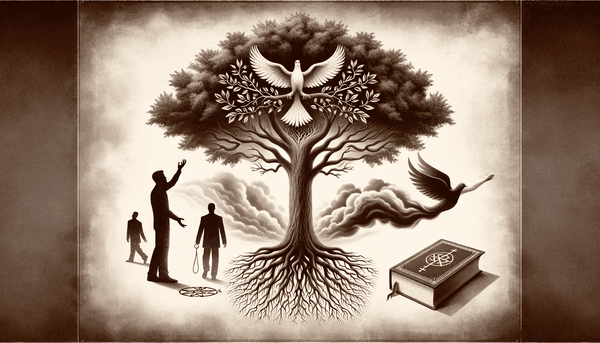The Tree of Life in Genesis
In the book of Genesis, the Tree of Life stands as a profound symbol of eternal life and a deep communion with God (Genesis 2:9). It is a testament to God's desire for mankind to enjoy everlasting life and fellowship with the divine. This tree not only symbolized sustenance and blessing in the idyllic Garden of Eden but also served as a reminder of God's provision and care for humanity. The narrative of the Tree of Life stretches beyond Genesis, reappearing in the book of Revelation (Revelation 22:2), where it stands in the New Jerusalem, symbolizing the unbroken continuity from creation to eternity, and God's enduring presence. It invites us to reflect on our own desires for life beyond the physical and to yearn for restoration and redemption, as promised through the wisdom that is a tree of life to those who lay hold of her (Proverbs 3:18) and the abundant life offered by Christ (John 10:10).
Joseph and the Power of Forgiveness
The narrative of Joseph, who forgave his brothers despite their betrayal, is a powerful testament to the transformative capability of forgiveness (Genesis 50:17). Joseph's gracious response to his brothers' wrongdoing, acknowledging God's sovereignty and provision, reflects a profound understanding of God's redemptive plan. This story emphasizes that forgiveness can lead to reconciliation and healing, offering a glimpse of God's plan for salvation — a theme that is reiterated in the teachings of Jesus Christ in the New Testament. As believers, we are challenged to forgive others, trusting in God's redemptive work in our lives and being agents of peace (Matthew 6:14-15, Ephesians 4:31-32, Colossians 3:13, Psalm 103:10-12).
The Dangers of the Spirit of Pride
Pride is often cited in the Bible as the root of downfall and is contrasted starkly with the virtue of humility. Biblical wisdom cautions us against the spirit of pride, urging self-examination and the embrace of humility (Proverbs 16:18). The scriptures extol the blessings that come to the humble and encourage service to others with a humble spirit (James 4:6, Philippians 2:3-4). By reflecting on Christ's example of humility and servitude, believers are called to emulate this in their own lives, offering an alternative to the world's celebration of self-promotion and pride. This call to humility is an invitation to experience God's favor, as He gives grace to the humble and exalts those who humble themselves (1 Peter 5:5-6, Matthew 23:12).






